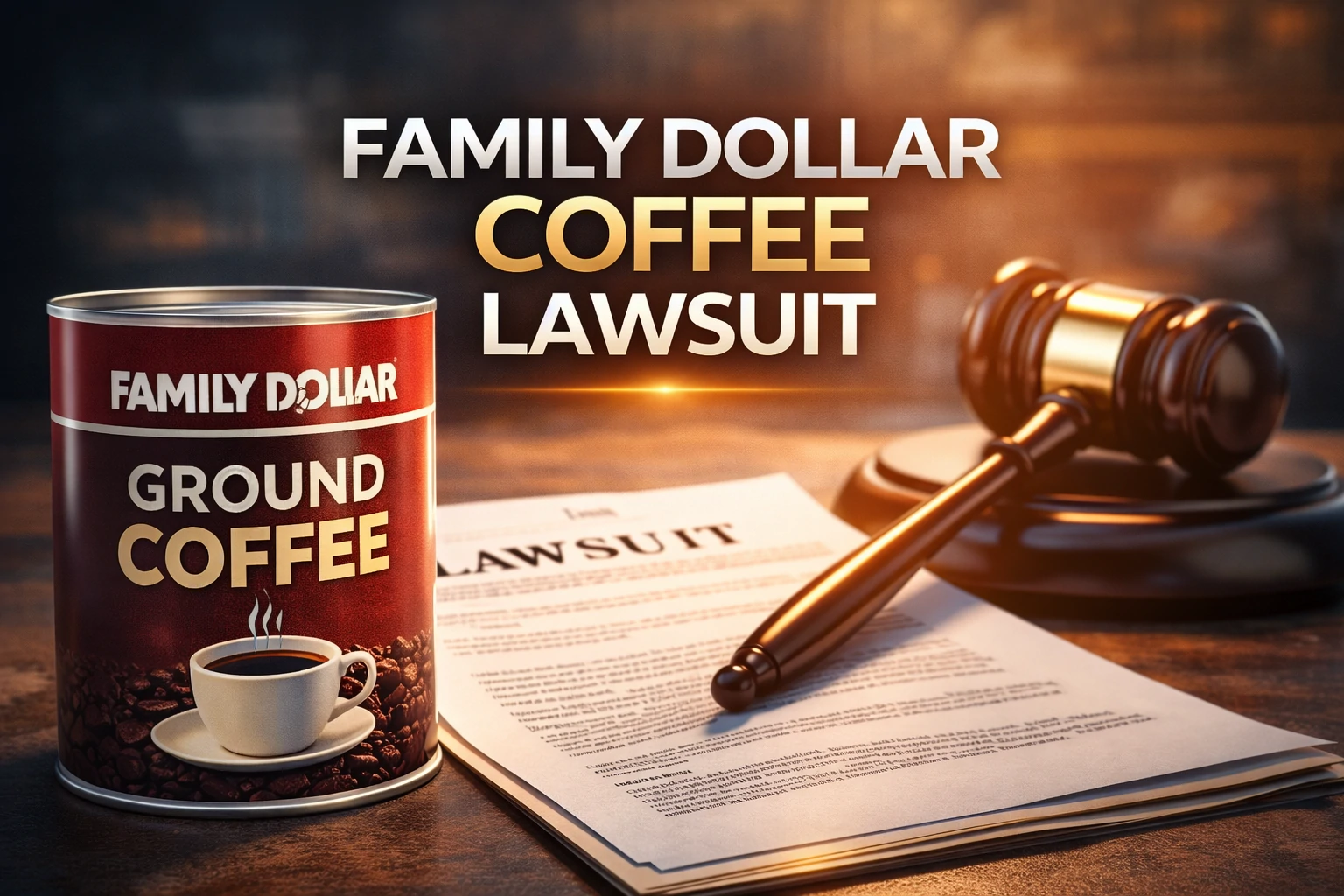Many people start the day with coffee. It brings warmth, focus, and comfort. Shoppers trust what the label says. They expect to get what they paid for. But that trust can break fast.
This happened with Family Dollar ground coffee. Buyers said the cans did not match what the label promised. They claimed the coffee made fewer cups than advertised. That raised concerns and led to a lawsuit.
Family Dollar faced a lawsuit over claims of false labeling. The case was not just about coffee. It raised questions about how companies sell products and what shoppers deserve. The legal system stepped in to decide what was fair.
This article explains what happened with the Family Dollar coffee lawsuit. It covers the claims, the settlement, and what it means for shoppers. If you bought this coffee, you may want to know your rights and how to claim money. Read on to get the full story in simple terms.
The Issue Behind the Lawsuit
The issue started with the label on the can. Buyers said the coffee claimed to make a certain number of cups. But when they checked, it made fewer than promised. That made people feel misled.
Many said they would not have bought the coffee if they knew the truth. They believed they paid more than the product was worth. The lawsuit said this was false advertising.
Family Dollar did not admit to any mistake. But they chose to settle the case. That means they offered money to close the matter without going to trial. Companies often do this to save time and cost.
This case focused on fair sales, label truth, and product size. It joins other cases where buyers challenge false or unfair claims.
Details of the Coffee Settlement
The court reviewed the case and approved a settlement. This means people who bought certain Family Dollar ground coffee products may get money back. But only some buyers qualify.
The settlement covers cans of ground coffee sold with labels that claimed a specific number of cups. These were sold at Family Dollar stores between certain dates. The court made a list of which products qualify.
You do not need to show a receipt to join the settlement. But if you do have proof of purchase, you may receive a larger payment. People without proof may still get a smaller amount. The money will come from a fund created by the company.
Each person can claim a refund based on how much coffee they bought. The more you bought, the more you may receive. The claim form will ask you to give simple details about your purchases.
Who Qualifies for a Payment?
To qualify, you must have bought the covered products at Family Dollar during the time listed in the case. The court usually posts these dates on the official settlement website.
You do not need to be a Family Dollar member or have a loyalty card. This case is open to anyone who made a qualifying purchase. The court wanted the process to stay fair and simple for all shoppers.
If you’re unsure about your purchases, you can still file a claim. The claim form is made for everyday people. It asks a few basic questions. If your answers match the rules, you may get money.
Many people worry they will not get paid without a receipt. But in this case, the court accepted claims without one. This helps people who did not keep their store slips but still remember buying the coffee.
Steps to Submit Your Claim
Filing a claim takes just a few steps. The settlement website offers a form that you can fill out online or print and mail. Each form asks for your name, contact details, and your best estimate of how many cans you bought.
If you have receipts, scan or attach them to your claim. If not, answer the questions truthfully. You may still qualify for a small payment. The court approved this process to make it fair to all buyers.
There is a deadline to file your claim. If you miss it, you lose your right to payment. The deadline will be listed on the official site, along with other case updates.
After you file, you may receive your payment by check or digital method. Most payments go out a few weeks after the court gives final approval.
Why This Case Matters
This lawsuit is more than just a refund for coffee. It shows how courts can protect buyers from unfair sales tactics. People have the right to expect honest labels and clear product details.
The case reminds stores to check what they promise on the package. If a label says 90 cups, it should make 90 cups. Even small differences matter when shoppers spend their money in good faith.
Many similar lawsuits have appeared across the country. These cases push companies to improve how they market their products. They also show buyers that they have power when they speak up.
This Family Dollar case will likely lead other companies to review their labels more closely. It sets an example of how the law steps in when something feels wrong.
What Happens Next?
After the court approves the settlement, the claims process begins. Everyone who qualifies can file during the open period. Then, payments will go out.
If you think you qualify, file your claim before the deadline. Stay honest in your answers. You do not need to hire a lawyer for this process. The court tried to make it simple for the public.
Once the settlement ends, no more claims will be accepted. If you miss your chance, you cannot reopen the case later. Check the official site often for updates.
Some product cases, like the Lola tampons lawsuit, show how small label issues can lead to big legal action.
Questions About the Settlement
Q. What is the Family Dollar coffee lawsuit about?
The case says some Family Dollar coffee cans promised more cups than they could make. Buyers felt misled and took legal action.
Q. Do I need a receipt to get a payment?
Receipts are not required. You can still file a claim if you give honest answers and meet the rules.
Q. Who can file a claim in this settlement?
Anyone who bought the listed ground coffee products at Family Dollar within the given dates may qualify.
Q. How much money will I get?
The amount depends on how much coffee you bought and whether you have proof. People with receipts may get more.
Q. Where do I file my claim?
Go to the official settlement website. Fill out the online form or mail it before the deadline listed there.
Q. Is this case final?
The court must approve the settlement before payments go out. Once approved, no more claims will be accepted after the deadline.
Closing Notes for Buyers
The Family Dollar ground coffee lawsuit shows how small things can lead to big legal action. A label that overstates product value is not just a mistake, it can lead to claims of unfair sales. In this case, people spoke up, and the court responded.
Arizona law and other state laws protect buyers from false advertising. This case reminds people that they have legal rights. Honest labeling matters, even on something as simple as a can of coffee.
If you bought Family Dollar ground coffee and believe you got less than promised, take action. The court has opened a path for refunds. File your claim, follow the rules, and wait for your result.
You do not need to feel powerless. Even large companies must answer to the law. This case shows how buyers can hold sellers accountable. In the end, the truth matters, and so do you.
This case joins others that protect consumers, such as the Chris Doherty Law Office New Hampshire case, where legal clarity proved vital.
Disclaimer:
This article shares general information about the Family Dollar coffee lawsuit. It does not give legal advice. Speak to a licensed attorney for help with your specific case.




